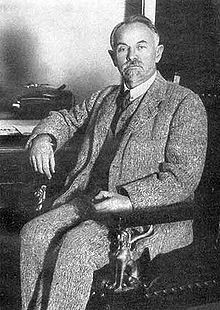Leonid Borissowitsch Krassin
Leonid Borisovich Krasin ( Russian Леонид Борисович Красин ; born July 3 . Jul / 15. July 1870 greg. In Kurgan ; † 24. November 1926 in London ) was a Russian revolutionary and former comrade of Stalin and Lenin .
Life path
Krassin completed an engineering degree in Saint Petersburg . As an activist in the student unrest in 1890, he and his brother were temporarily exiled to Nizhny Novgorod . After completing his studies, Krassin worked as an engineer in Baku . He was one of the first publishers of Pravda and in 1903 became a member of the Central Committee of the Bolsheviks , a movement in the RSDLP , from which the later CPSU emerged .
Following the crushed Russian Revolution in 1905 , the tsarist autocracy proceeded against their political opponents with repression, arrests and bans. The Bolsheviks and other parties were driven underground. During this phase, Krassin was the organizer of armed robberies that were directed against tsarist institutions and were supposed to secure the livelihood of the Bolsheviks. It was named by them after the Marxian term (" expropriations "), with which they are not to be equated in terms of content. The Mensheviks rejected robbery as a means of funding and relied on membership fees because they also had many members. They threatened to be expelled from the party. The exclusion from the party was only carried out against Stalin. Krassin's knowledge of chemistry also made him an explosives expert for the Bolsheviks. Along with Lenin, Stalin, Ordzhonikidze , Kamenew , Sergei Allilujew (1866–1945) and Olga Allilujewa (1877–1951), Maria Essen (1872–1956), Inessa Armand , Krupskaya and Litvinov, he belonged to her core.
In 1908 Krassin emigrated to Germany, where he initially worked for Siemens-Schuckertwerke in Berlin . Later he rose to the position of deputy director of the Russian Siemens-Schuckertwerke AG. Shortly before the start of the First World War , he was given the management of the Russian Siemens branches.
After the October Revolution in 1917, Krassin was People's Commissar for Trade and Industry from November 1918 , then People's Commissar for Foreign Trade until 1923. This included his management of the Soviet trade agency in London (1921-23). He was ambassador in Paris in 1924 and in London in 1925. During the embalming of Lenin, he supervised the work of doctors and chemists and commissioned the construction of a mausoleum .
A Soviet icebreaker , the Krassin , was named after Krassin , which he was able to buy back from the British government in 1921 thanks to his diplomatic skills. The GDR river cruise ship Leonid Krasin , built in 1989, also bears his name.
After Krassin's death, his urn was buried on the Kremlin wall in Moscow.
Works
- The prospects for Russian exports , Kniga Verlag, Berlin 1923.
- Voprosy vnešnej torgovli [Problems of Foreign Trade], Gos Publishing House. Izd., Moscow / Leningrad 1928.
literature
- Carrère d'Encausse, Hélène: Lenin . Piper Verlag, Munich 2000, ISBN 3-492-04199-X .
- Smith, Edward Ellis: Young Stalin . Droemer Knaur 1969.
- Lubov Krassin: Leonid Krassin: His Life and Work , Skeffington, London ca.1929.
Web links
- Article Leonid Borissowitsch Krassin in the Great Soviet Encyclopedia (BSE) , 3rd edition 1969–1978 (Russian)
- Biography , Chronos
- Newspaper article about Leonid Borissowitsch Krassin in the press kit of the 20th century of the ZBW - Leibniz Information Center for Economics .
swell
- ↑ http://www.stern.de/wirtschaft/unternehmen/506360.html
- ^ Martin Lutz (University of Konstanz): Siemens and the Soviet Union after the First World War .
- ↑ Hubert Schneider: The Soviet foreign trade monopoly 1920-1925 , Verlag Wissenschaft und Politik, Cologne 1973, p. 17, ISBN 3-8046-8471-8
- ↑ Manfred Hildermeier : History of the Soviet Union 1917-1991. Origin and decline of the first socialist state , Verlag CH Beck, Munich 1998, p. 326.
| personal data | |
|---|---|
| SURNAME | Krassin, Leonid Borissowitsch |
| ALTERNATIVE NAMES | Красин, Леонид Борисович (Russian) |
| BRIEF DESCRIPTION | Russian revolutionary and comrade in arms of Lenin |
| DATE OF BIRTH | July 15, 1870 |
| PLACE OF BIRTH | Kurgan |
| DATE OF DEATH | November 24, 1926 |
| Place of death | London |
